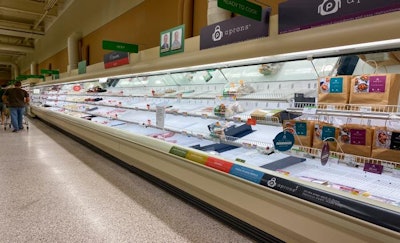
The American Egg Board (AEB) released a consumer pulse update by conducting a survey to provide consumer perceptions and changing eating and shopping behaviors in the current environment influenced tremendously by the COVID-19 pandemic.
There were 1,028 interviews, fielded March 13-16, from the U.S. adult population, with sample ages of 18 and over.
AEB's latest survey results indicated:
- 32% are less likely to go out to eat
- 33% are more likely to cook at home
- 32% have stocked up on basic food items including milk, bread, and eggs
When asked what products consumers would buy if fresh shell eggs are unavailable:
- 32% would buy liquid eggs
- 31% would buy egg whites
- 20% would buy precooked hard-boiled eggs
- 20% would buy frozen egg sandwiches
- 32% would not buy any alternative products
Now, obviously, as state lawmakers continue to put stay-at-home orders in place, it will impact the number of people willing to go out to eat instead of cook at home.
My question is how will these numbers increase as the economy starts to feel the impact of COVID-19. Can we assume that if people are not going out to eat, they will be buying more eggs to eat solely or cook with? If only 32% of people had stocked up on basic food items at the time of this survey, will this number increase as fear takes over citizens in states afraid that a stay-at-home order will come?
Cage-free eggs
Brian Moscogiuri, director and egg market analyst, Urner Barry, explained that the wholesale egg market now sits over $2 per dozen, on an Urner Barry podcast on LinkedIn, on March 18. He reported that prices for wholesale eggs had increased by over 100% in the last few weeks.
Then there is this thought, are we seeing proof that when people are truly in need, they do not care what kind of eggs they are, conventional or not, they will purchase them as a cheap and healthy form of protein.
It’s important to keep in mind that the people who have been laid off or lost their jobs may increase their egg consumption to supplement more expensive forms of protein.
Moscogiuri explained that some stores that were only offering specialty eggs have restocked with cage-produced eggs. "The wholesale market is extremely competitive. We have seen inventories drop 10% per week for the last three weeks," he said on the March 18 podcast.
Will the inevitable hit to the economy force companies that have pledged to go cage-free eggs back out on its promise and stay with conventional eggs to decrease product cost and in return increase sales? If this is the case, cage-free houses will not need to go up at the rate in which so many feared that they would.
Meat sales
Meat department sales without deli meat were up an incredible 76.9% over the week ending March 15, 2020 versus the comparable week in 2019, according to data insights firm IRI, and deli meat sales advanced 40.4%.
Regardless of the meat-based product, consumers were buying whatever they could get their hands on. Processing plants are ramping up capacity and distributors are diverting supply from foodservice to food retail.
In absolute dollars, the five biggest winners for the week of March 15 were ground beef (+$179.1 million), chicken breasts (+$89.5 million), pork loin (+$36.9 million), chuck ($36.3 million) and ribeyes (+$31.6 million), according to IRI.
It is hard to say how long fear will drive the need for meat. I believe that once people are allowed to get out again, assuming it's not too long, we will see a huge surge in foodservice sales rather than retail sales.
Final thoughts
In the coming weeks, I think we will continue to see a demand for certain things in the grocery stores, including eggs. I don't think consumers are going to care how the product gets to them or what specialties it has to offer if they can get it.
The world is full of questions related to COVID-19 at this time. It will be interesting to see what long term impacts this virus has on our meat and egg industries.
View our continuing coverage of the coronavirus/COVID-19 pandemic.

















